History of the Nashville Sounds
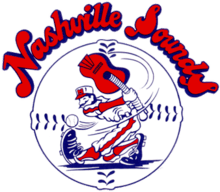
The Nashville Sounds Minor League Baseball team was established in Nashville, Tennessee, in 1978, after Larry Schmittou and a group of investors purchased the rights to operate an expansion franchise of the Double-A Southern League. The Sounds played their home games at Herschel Greer Stadium from its opening in 1978 until the end of the 2014 season. In 2015, the Sounds left Greer for First Tennessee Park, a new facility located on the site of the historic Sulphur Dell ballpark, home to Nashville's minor league teams from 1885 to 1963.
The Sounds led all of Minor League Baseball in attendance in their inaugural season and continued to lead the Southern League in attendance in each of their seven years as members of the league. On the field, the team won six consecutive second-half titles from 1979 to 1984 and went on to win the Southern League championship twice: first, in 1979 as the Double-A affiliate of the Cincinnati Reds, and again in 1982 as the Double-A affiliate of the New York Yankees.
In an effort to position Nashville to contend for a Major League Baseball franchise in the future, Schmittou and team owners purchased the Triple-A Evansville Triplets of the American Association and relocated the team to Nashville before the 1985 season. The Triple-A Sounds carried on the history of the Double-A team that preceded it. The team rarely contended for the American Association championship, making only three appearances in the postseason during their 13 years in the league.
The Sounds became members of the Triple-A Pacific Coast League (PCL) in 1998 following the dissolution of the American Association after the end of the previous season. Though they did not perform well during their first few years in the PCL, the team went on to win four division titles, two American Conference titles, and one PCL championship between 2003 and 2007. Their lone PCL title was won in 2005 as the Triple-A affiliate of the Milwaukee Brewers. The only time the Sounds have qualified for the postseason since was in 2016 when they won the division championship but were eliminated in the conference series.
Prior professional baseball in Nashville
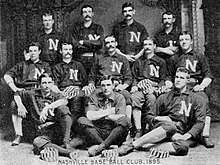
Nashville has hosted Minor League Baseball teams since the late 19th century. The city's professional baseball history dates back to 1884 with the formation of the Nashville Americans, who were charter members of the original Southern League from 1885 to 1886 and played their home games at Athletic Park, later renamed Sulphur Dell.[1][2] This ballpark was the home of Nashville's minor league teams through 1963. In 1887, Nashville's Southern League team was called the Nashville Blues.[3] The Nashville Tigers competed for the city in the same league from 1893 to 1894.[3] In 1895, the Nashville Seraphs won the city's first professional championship in the Southern League.[3] The Nashville Centennials played in the Central League in 1897, but relocated to Henderson, Indiana, during the season before the league's collapse.[4]
The city's longest-operating baseball team, first known as only the Nashville Baseball Club and later renamed the Nashville Vols (short for Volunteers), was formed in 1901 as a charter member of the Southern Association.[5] They remained in the league through 1961, winning eight pennants, nine playoff championships, and four Dixie Series titles.[6][7] The league disbanded after the 1961 season, and no team was fielded in 1962, but the Vols played one final season in the South Atlantic League in 1963.[8] Sulphur Dell was demolished in 1969,[9] and the city went without a professional baseball team for 14 years until 1978.[8]
Getting a team and building a ballpark
Larry Schmittou, head coach of the Vanderbilt Commodores baseball team from 1968 to 1978,[10] was instrumental in bringing professional baseball back to Nashville. He was inspired to get involved with Minor League Baseball when he observed the large crowds and sellouts the Chattanooga Lookouts experienced after owner Walter Reed acquired the Birmingham Barons and relocated the team to Chattanooga in 1976.[11][12] Schmittou was told by multiple Major League Baseball teams that they would be willing to put a minor league affiliate in Nashville if he provided a suitable ballpark.[11]
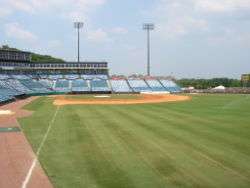
Schmittou learned from a member of the Metro Board of Parks and Recreation that neither the Park Board or the city of Nashville would be willing to pay for such a park.[11] So, Schmittou, along with help from country musician Conway Twitty, put together a group of investors including other country artists Cal Smith, Larry Gatlin, Jerry Reed, and Richard Sterban (bass singer of the Oak Ridge Boys), as well as other Nashvillians, to finance a stadium and a minor league team.[13][14] Twenty shares valued at US$15,000 each were issued; Schmittou purchased 2 shares, or 10 percent of the team,[15] and Twitty purchased 4 shares for a 20 percent stake.[16] The Metro Parks Board agreed to lease to Schmittou the site of Nashville's former softball fields on the grounds of Fort Negley, an American Civil War fortification, approximately two miles (3 km) south of downtown, for a period of 20 years as long as he built a stadium with a minimum capacity of 6,500 at a cost of at least $400,000 within 10 years.[17] In the second ten years, he would be required to pay the city seven percent of the team's total revenue.[17]
Stoll-Reed Architects advised Schmittou that construction of a suitable stadium would cost between $300,000 and $500,000;[17][18] but bids for the project ranged from $980,000 to $1.2 million.[17] Schmittou looked to local suppliers to donate construction materials, took out a $30,000 loan from a bank, sold season tickets in advance of having a team, and even mortgaged his own home to help pay for the facility.[18] The actual cost totaled $1.5 million.[16] The ballpark would be named Herschel Greer Stadium in posthumous honor of Herschel Lynn Greer, a prominent Nashville businessman and the first president of the Nashville Vols, whose family donated $25,000 for stadium construction.[19]
Having secured a stadium, Schmittou and general manager Farrell Owens attended the 1976 Winter Meetings in hopes of landing a team. After sending letters to all 26 farm team directors, the pair received a letter from Sheldon "Chief" Bender of the Cincinnati Reds. Bender met with the pair and agreed to put a team in Nashville provided a stadium was built.[20] Schmittou was then granted a franchise in the Southern League, a class Double-A league, at an enfranchisement cost of $7,500.[21]
Fans were invited to submit suggestions for the team's name which would be voted on by a group that included local sports writers and county musicians.[22] Among the finalists were "Stars", "Notes", "Hits", "Strings", "Kats", "Pickers", and "Vols".[22][23] The chosen name, "Sounds", is a play on the term "Nashville sound", a subgenre of American country music that traces its roots to the area in the late-1950s.[24] The team's wordmark and color scheme were lifted from the Memphis Sounds of the American Basketball Association (ABA), who used them from 1974 to 1975. When the ABA merged with the National Basketball Association in 1976, some of the copyrights were allowed to lapse, and Nashville's baseball team adopted the abandoned scheme.[25] The color blue was added to Memphis' red and white palette. Nashville's original logo, which was used from 1978 into 1998, and was initially sketched by Schmittou, reflected the city's association with the country music industry.[23] It depicted a mustachioed baseball player, nicknamed "Slugger," swinging at a baseball with a guitar, a staple of country music, in place of a bat.[24] Further illustrating the city's musical ties was the typeface, with letters that resembled musical notes and treble clefs, used to display the team name.[24]
Southern League
Cincinnati Reds (1978–1979)

With a team in place and a stadium under construction, the Nashville Sounds were set to begin play in 1978 as an expansion team of the Southern League.[26] As the Double-A affiliate of the Cincinnati Reds,[26] the Sounds played their first game on April 15, 1978, against the Memphis Chicks at Memphis' Tim McCarver Stadium, which they lost, 4–2.[27] The Sounds recorded their first win the next evening, defeating Memphis, 3–0.[28] Meanwhile, construction on Greer Stadium continued in order to be ready for the home opener. The team had requested to open the season on the road and had to swap a series with the Chattanooga Lookouts to have enough time to complete the stadium.[18] On April 26, the Sounds played their first home game, a 12–4 victory against the Savannah Braves in front of a sellout crowd of 8,156 fans.[29] The Greer home opener was scheduled to take place the previous evening, but was rained out.[18] Tractors and grading machines were still preparing the field on game day, and the electricity was turned on only five minutes before the gates opened.[18] Much of the sod that had been laid that winter died, and the replacement sod arrived late and had to be laid the day before the scheduled opening game.[30] The Sounds finished their inaugural 1978 season under manager Chuck Goggin with a 64–77 record and failed to win either half of the Southern League's split-season, leaving them out of the championship playoffs.[31] Bruce Berenyi was selected for the league's Most Outstanding Pitcher Award.[32]
The team incurred more success at the turnstiles than on the field. The Sounds led all of Minor League Baseball in attendance by drawing 380,000 fans in their first season.[14] Nashville went on to lead the Southern League in attendance in each of their seven seasons as members of the league.[14] Schmittou's business philosophy revolved around earning profits not from ticket sales, but from the sale of souvenirs and concessions.[33] This philosophy also involved promoting entertainment value, or fun, as much or more than promoting the baseball game.[18] The franchise was recognized for its promotion efforts when it won the Larry MacPhail Award for outstanding minor league promotions in 1978, 1980, and 1981.[34] Schmittou was awarded the Sporting News Double-A and Southern League Executive of the Year Awards in 1978 and 1981.[35]
Under manager George Scherger, the Sounds started the 1979 season poorly, before rallying to win 20 of 31 games in late May and June. They entered the last day of the first half of the season in first place, but lost their game to their cross-state rivals, the Chicks, and finished in second place. The Sounds and Chicks met again on the last day of the second half in a split doubleheader; both games were won by Nashville.[36] The two teams then faced-off in a best-of-three series to determine the Western Division champion. The Sounds won the series, two games to one, before advancing to the league championship series against the Columbus Astros. Nashville captured their first Southern League championship by defeating the Astros, three games to one.[37] Schmittou wanted to give each player a $1,000 bonus for winning the pennant, but as that would have been against the National Association's rules, he settled for buying them championship rings instead.[16] Geoff Combe, with a league-leading 27 saves,[38] won the league's Most Outstanding Pitcher Award.[32] The Sounds compiled an 83–61 record that season.[39] During the All-Star Break between the halves of the season, Nashville played host to the Southern League All-Star Game. The contest pitted a team of the league's All-Stars against the major league Atlanta Braves. The All-Stars defeated the Braves, 5–2. Nashville's Duane Walker was named the game's Most Valuable Player (MVP).[40]
Originally, the Reds allowed Nashville to use a designated hitter (DH) in their lineups. However, this allowance was later revoked, as the Reds were a part of the National League, which did not use a DH. Schmittou issued an ultimatum: if Cincinnati would not let the Sounds use a DH in their lineups, they would not renew their contract and would look for a new major league affiliate. The Reds did not budge on their decision to prohibit the DH, so the Sounds looked for a new affiliate after 1979. Schmittou was then approached by five or six clubs looking to enter the Southern League as a Sounds affiliate.[18] After two seasons at Double-A for the Reds, Nashville had a 147–138 record.[41]
New York Yankees (1980–1984)
Schmittou had originally been encouraged by the New York Yankees organization to establish the Sounds as a Triple-A team, but he refused to go back on his previous promise to partner with the Reds at Double-A.[18] After the split with Cincinnati, the Sounds made their first affiliation switch in 1980, becoming the Double-A affiliate of the Yankees. Under manager Stump Merrill, the 1980 Sounds finished the first half of the season one-and-a-half games behind the Memphis Chicks. In the second half, the team finished in first place, 14 games ahead of the second-place Montgomery Rebels.[26] In the Western Division championship series, Nashville lost to Memphis, three games to one.[42] Nine Southern League records were set during the season, the team's pitching staff led the league in earned run average (ERA) and strikeouts, and Steve Balboni, the league MVP,[43] led the league with 101 runs, 34 home runs, 122 runs batted in (RBI), and 288 total bases.[26][44] Andy McGaffigan was selected as the league's top pitcher.[32] The Sounds also set a league attendance record, when a total of 575,676 fans visited Greer Stadium.[26] This record still stands as of the completion of the 2017 season. Their 97–46 record is the franchise's all-time best.[45] In 2001, the 1980 Sounds were ranked as the sixty-ninth greatest minor league baseball team of all-time by baseball historians.[26]
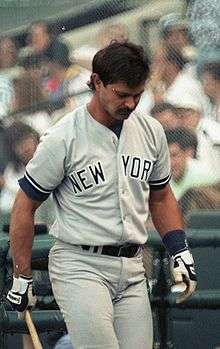
On April 16, 1981, the Yankees made a stop in Nashville to play an exhibition game against the Sounds. The 10–1 Yankees victory was played in front of a standing room only crowd of 17,318 fans.[47] Those on hand for the game included Yankees owner George Steinbrenner, coach Yogi Berra, and players Reggie Jackson, Bucky Dent, Lou Piniella, Bobby Murcer, Goose Gossage, and Tommy John.[47] The Sounds won the second half of the season and went on to win the Western Division championship after defeating the Chicks in three straight games, but suffered defeat in the best-of-five league championship series, falling to the Orlando Twins, 3–1.[42] Nashville compiled an 81–62 record during the season under Merrill.[48] Jamie Werly won the Southern League Most Outstanding Pitcher Award after leading the circuit with 18 complete games and 193 strikeouts.[32][49] Don Mattingly and Willie McGee, who both played for the Sounds in 1981, were later promoted to the major leagues. In 1985, Mattingly was named the American League Most Valuable Player and McGee named the National League MVP.[50]
The 1982 Sounds, under manager Johnny Oates, won the second half of the season and met the Knoxville Blue Jays in the division playoffs. After defeating the Blue Jays, 3–1, the Sounds advanced to the league championship series to play against the Jacksonville Suns.[42] Nashville defeated the Suns, 3–1, clinching the franchise's second Southern League championship.[37] The team's season record was 77–67.[51] Brian Dayett was selected as the Southern League MVP.[43] Stefan Wever, who had a league-leading 191 strikeouts,[52] was the league's Most Outstanding Pitcher.[32] Wever was the fifth Sounds pitcher in five years to win the award. Otis Nixon set the career franchise record in stolen bases (133) during the 1981 and 1982 seasons.[53]
The Yankees returned for another exhibition game against the Sounds on April 28, 1983. New York had a four-run lead going into the bottom of the ninth inning, but a five-run rally with two outs propelled the Sounds to a 5–4 win in front of 13,641 fans.[54] Among the Yankees in attendance for the game were manager Billy Martin, coach Berra, and players Gossage, Ken Griffey Sr., Dave Winfield, Piniella, and Willie Randolph.[54] During the season, manager Doug Holmquist, frustrated with the team's disappointing first half, instituted a system of fines for player infractions or poor performance on the field. The program ranged from a $10 fine for a pitcher walking a batter with one on and two outs to a $100 fine for missing curfew.[55] Rebounding, Nashville won the second-half pennant, earning the team a shot at the Western Division championship. The Sounds, however, lost the fifth game of the best-of-five series to the Birmingham Barons by a score of seven runs to five, ending their season.[55] The Sounds finished 30 games over .500, with an 88–58 record.[56] Pitcher Werly set the career franchise strikeout record (352) when he played for the Sounds in 1980, 1981, and 1983.[53] The midseason Southern League All-Star Game returned to Nashville in 1983. The Sounds hosted the event and served as the All-Star team's competition. The All-Stars recorded the victory with a score of three runs to two.[40]
The Sounds were one game shy of winning the first-half pennant in 1984. Winning the first-half title is something that eluded the team during its entire seven-year span in the Southern League.[57] One highlight of the first half of 1984 took place on May 4, when Jim Deshaies pitched the club's first no-hitter against the Columbus Astros in the second game of a seven-inning doubleheader. The Astros' lone run was scored following three walks and a batter being hit by a pitch, advancing a runner home.[58] Nashville finished the second-half tied for first place with the Birmingham Barons, but won the second-half title for the sixth consecutive season after defeating Birmingham in a playoff game.[57] The Sounds met the Knoxville Blue Jays in the Western Division finals, but the Blue Jays emerged the victor, winning three games to one.[42] Skipper Jim Marshall led his Sounds to a 74–73 record.[59] Nashville accumulated a 417–306 record during their five-year affiliation with the Yankees.[41]
American Association
In 1983, Sounds President Schmittou noticed a 5 percent drop in season ticket sales, a higher ratio of no-shows from season ticket holders, and a slight decline in overall attendance.[60] These issues with spectator turnout were accompanied by a decline in local media coverage, particularly in regard to road games. In order to boost interest in the team, Schmittou tried, unsuccessfully, to purchase a Triple-A franchise late in the 1983 season. His desire to land a Triple-A team was part of a larger plan to put Nashville in a position to contend for a Major League Baseball franchise in the future.[61] Attendance continued to drop in 1984, as season ticket sales were down 12 percent and overall attendance was down almost 20 percent.[60]
Schmittou arrived at terms in June 1984 to purchase the Triple-A Evansville Triplets of the American Association, with plans to move the franchise from Evansville, Indiana, to Nashville for the 1985 season. In order to prove to the team's Nashville banks, which would back the purchase, that the move was financially viable, Schmittou commissioned a survey to evaluate the potential turnout for a Triple-A team versus a Double-A team. Though the research proved to team owners that the move was a sensible decision, the banks were not impressed. As a result, the team switched banks and went ahead with the purchase and relocation.[60] The Southern League wanted Schmittou to surrender his franchise to the league, but he had plans to relocate the team instead.[62] He wanted to send Nashville's existing Southern League franchise to Evansville to continue as the Triplets at Double-A. However, a combination of the league's disapproval of the move and the City of Evansville being unwilling to upgrade Bosse Field resulted in a move to Huntsville, Alabama, where the team became the Huntsville Stars.[62] The Triple-A Sounds carried on the history of the Double-A team that preceded it. The Triplets' legacy was retired, and the Stars were established as an entirely new franchise.[62]
Detroit Tigers (1985–1986)
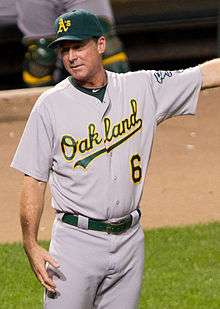
The Sounds entered the Triple-A playing level in 1985 as an affiliate of the Detroit Tigers playing in the American Association. They played their first Triple-A game on April 11, a 3–1 win, against the Buffalo Bisons at Greer Stadium.[63] The next day, Nashville competed in an exhibition game against their major league affiliate. The Tigers outlasted the Sounds, winning by a score of 9–3 in the tenth inning.[63] Seven games into the season, manager Lee Walls came down with an illness, and Nashville outfielder Leon Roberts became the acting manager for seven games until Gordon Mackenzie was brought on to lead the club for the rest of the year.[64] On July 17, Bryan Kelly pitched the club's second no-hitter against the Oklahoma City 89ers, as the Sounds won, 6–0.[58] Nashville ended the season with a 71–70 record and in second place in the Eastern Division, two-and-a-half games out of first behind the eventual league champion Louisville Redbirds.[65]
The 1986 team was managed by former player Leon Roberts. The Sounds finished third in their division with a 68–74 regular season record,[66] their first losing season since the inaugural 1978 campaign. Also that year, the Sounds were enlisted to serve as the competition in the Southern League All-Star Game, held in Huntsville. The game was won by Nashville with a score of four runs to two.[40] The team ended their affiliation with Detroit after two seasons of poor attendance and a lackluster 1986 campaign.[61] Their two-year record with the Tigers amounted to 139–144.[41]
Cincinnati Reds (1987–1992)
The Sounds rejoined the Cincinnati Reds farm system in 1987, this time as their Triple-A affiliate. As a result, a number of minor leaguers played in the Reds organization at two different levels with Nashville. Spending the beginning of the 1987 season around the top of the standings, the team hit a slump after losing a few key players midseason. The result was a 64–76 record and a last-place finish under skipper Jack Lind.[67] One player lost due to injuries was third baseman Chris Sabo. He was promoted to Cincinnati in 1988 and was named the National League Rookie of the Year, a first for any former Sounds player.[68]
The 1988 Sounds were in last place and had a losing record until making numerous management changes late in the season. During a two-week period in July and August 1988, the Sounds went through five different managers. The team started the season with Lind, who left due to health problems.[69] His position was filled on an interim basis by pitching coach Wayne Garland until George Scherger, manager of the 1979 Southern League championship Sounds, was brought in. He retired after one game and was replaced by Jim Hoff, who stayed a few days before taking up a position with the Reds' front office.[69] Finally, former Texas Rangers manager Frank Lucchesi was hired to lead the Sounds for the rest of the season.[69] Lucchesi managed the team's last 39 games, leading them to a final record of 73–69.[70] They finished second in the Eastern Division, sixteen games behind the Indianapolis Indians, who went on to win the league championship.[70]
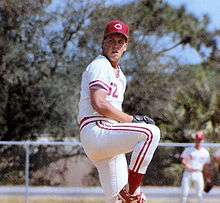
Greer Stadium was home to a rare baseball occurrence on August 6 and 7, 1988, when Nashville and Indianapolis exchanged no-hitters on back-to-back nights. First, Indianapolis' Randy Johnson and Pat Pacillo combined for a no-hit loss against the Sounds, a 1–0 Nashville win.[71] That game was won by Nashville when Lenny Harris walked to first base, stole second base and third base, and then came home, scoring on a groundout.[71] The next night, Nashville's Jack Armstrong pitched a no-hit game against the Indians, a 4–0 Sounds victory. This was the first time in American Association history that teams played in back-to-back no-hit games, and was the third no-hitter in Sounds franchise history.[71]
Lucchesi continued to manage the Sounds in 1989, leading the team to a third-place finish with a 74–72 record.[72] Pitcher Hugh Kemp set the career franchise records for games started (73) and walks (207) while playing for the team from 1987 to 1989.[53] On April 23, 1990, 14,012 fans attended an exhibition game at Greer between Nashville and Cincinnati in which the Big Red Machine beat the Sounds, 3–0.[73] Despite being shutout by their major league affiliate, the Sounds experienced their most successful season in the American Association in 1990, when they compiled an 86–61 record under manager Pete Mackanin.[74] Ending the regular season in a tie for first place with the Buffalo Bisons, the Sounds won the Eastern Division championship in a one-game playoff. The extra-inning affair was ended by Chris Jones' two-run homer in the top of the eighteenth inning.[75] The Sounds advanced to their first American Association championship series, where they lost to the Omaha Royals, three games to two.[76] Left-hander Chris Hammond, who led the circuit with 15 wins and 149 strikeouts,[77] won the league's Most Valuable Pitcher Award for 1990.[78] Nashville set their all-time attendance record that year when a total of 605,122 fans came out to Greer Stadium.[79] Skeeter Barnes, who had previously played with Nashville in 1979, set the career franchise records for games played (514), at bats (1,848), and hits (517) during his second stint from 1988 to 1990.[53]
In 1991, the Sounds started the year in first place, where they remained for only ten days. By May 1, they had fallen into third place in the Eastern Division, where they remained for the rest of the season. Mackanin's Sounds posted a losing record every month during the season and finished the year 16 games behind first-place Buffalo with a 65–78 record.[80]
From 1988 to 1991, American Association teams participated in interleague play with teams from the Triple-A International League in a partnership called the Triple-A Alliance. The Sounds had an interleague record of 90–78 over this four-year period.[81] In 1992, Mackanin was dismissed from his managerial duties on June 28.[82] He was replaced by Dave Miley, who was managing the Reds' Double-A affiliate, the Chattanooga Lookouts.[83] The 1992 Sounds posted a 67–77 record, winding up in fourth place.[84]
Greer Stadium, once one of the best stadiums in Triple-A baseball in terms of player and fan amenities,[85] began to be outshined by newer state-of-the-art ballparks being built in the late 1980s.[86] The Reds let their player development contract with the Sounds expire so they could place their Triple-A affiliate in Indianapolis, which was closer to Cincinnati and planning to build a new stadium.[86] Nashville entered the offseason unsure of their next major league affiliate. Their final record after six years with the Reds at Triple-A was 429–433.[41]
Chicago White Sox (1993–1997)
With few options available, the Sounds signed an affiliation agreement with the Chicago White Sox, who wanted to move their Triple-A farm club closer to home than their previous location in Vancouver.[86] The White Sox presented a list of complaints about the relatively poor condition of Greer Stadium. Schmittou was unable to convince Mayor Phil Bredesen or the Metro Council to pay for a new stadium to replace Greer.[87] He considered moving the team to a surrounding county, and explored sites in La Vergne, Cool Springs, and Mount Juliet.[88] He even tried, unsuccessfully, to get the Metro Council to pass a referendum to let taxpayers vote on a temporary tax increase to pay off a proposed $40 million stadium in three years.[87] In the end, Schmittou elected to keep the Sounds at Greer but make significant improvements to the stadium. One of those improvements was the addition of Greer's signature guitar-shaped scoreboard, which was installed in 1993.[89]
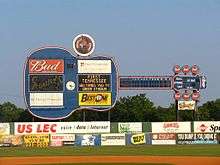
In their first year with the White Sox, the Sounds clinched the Eastern Division title with an 81–62 record.[90] In the league championship series, the Sounds lost to the Iowa Cubs, four games to three, in a decisive extra-inning game seven.[76] Nashville's Rick Renick, who managed the club from 1993 to 1996, was named the American Association Manager of the Year in his first season.[78]
The Sounds shared Greer Stadium with the Southern League's Nashville Xpress, previously known as the Charlotte Knights, during the 1993 and 1994 seasons. This came about when Charlotte acquired a Triple-A expansion franchise in 1993, leaving the city's Double-A team without a home. Schmittou offered Greer as a temporary home ballpark for the team. To accommodate an additional club at Greer, the Xpress scheduled its home games during the Sounds' road trips.[91] In 1995, the Xpress relocated to Wilmington, North Carolina, and became the Port City Roosters.[92]
In 1994, the Sounds had an 83–61 record, placing them in second,[93] and qualifying them for their second consecutive appearance in the league playoffs. In the first round, Nashville swept the New Orleans Zephyrs in three straight games to advance to the league finals.[76] In the best-of-five championship series, the Indianapolis Indians defeated the Sounds, three games to one.[76] Nashville hosted the mid-summer Triple-A All-Star Game in 1994. Nashville's Renick managed the team of American League affiliated All-Stars which included Sounds players Ray Durham, Drew Denson, and Scott Ruffcorn, however Ruffcorn was later placed on the disabled list and replaced by Steve Schrenk. Durham won the All-Star Game's Most Valuable Player Award.[94] Ruffcorn, who led the American Association with 15 wins,[95] was selected as the association's Most Valuable Pitcher for 1994.[78]
The Sounds compiled a 68–76 record, 20 games out of first place, in 1995.[96] Originally, Michael Jordan, who played with the White Sox's Double-A Birmingham Barons in 1994, was slotted to play the 1995 season as a non-drafted free agent for the Sounds. However, with the ongoing MLB strike, Jordan decided to quit the sport rather than becoming a replacement player and being labeled a strikebreaker.[97] The team improved their record in 1996, ending up with 77 wins and 67 losses.[98] Despite a decent winning percentage, Nashville failed to secure a spot in the playoffs. Outfielder Jeff Abbott won the Rookie of the Year Award, and Renick earned his second Manager of the Year Award.[78] Joey Vierra pitched in a career franchise-record 238 games from 1990 to 1992 and 1994 to 1995.[53]
The 1996 season marked the last that Schmittou was the team's principal owner and president. With the city prepared to welcome a National Football League franchise, the Tennessee Titans, Schmittou felt that revenue would be drawn away from his baseball team, so he sold his entire financial interest in the Sounds to Al Gordon, president of AmeriSports Companies LLC.[18] In 1997, under the guidance of manager Tom Spencer, Nashville put together a 74–68 campaign,[99] again failing to win either half of the season, excluding them from the playoffs. In addition to being selected for both the midseason and postseason All-Star teams, outfielder Magglio Ordóñez won the Triple-A All-Star Game MVP Award and garnered the league's Most Valuable Player and Rookie of the Year Awards.[78] Ordóñez had led the league with 172 hits, and tied for first with a .329 batting average and 249 total bases.[100] The five-year White Sox affiliation ended after the 1997 season with the Sounds having a 383–335 record over that period.[41]
Pacific Coast League
Pittsburgh Pirates (1998–2004)
The American Association, of which the Sounds had been members since 1985, disbanded after the 1997 season. Its teams were absorbed by the two remaining Triple-A leagues—the International League and Pacific Coast League (PCL). Nashville joined the PCL, making it the eastern-most team in the league.[101] The franchise also picked up a new major league affiliation, becoming the top farm club of the Pittsburgh Pirates. For the first time since the team's foundation in 1978, the Sounds began to adopt a new logo, color scheme, and uniforms over the course of the 1998 and 1999 seasons.[102] The original red, white, and blue colors were replaced by red, black, and white. The new team logo, replacing the original "Slugger", consisted of a black, red, and white music note surrounded by a circle of the same colors bearing the team name in a modern font.[103]
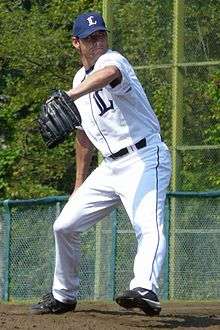
In 1998, the team's first season as a Pirates affiliate, the Sounds finished last in the American Conference East Division with a 67–76 record.[104] The Sounds were led by manager Trent Jewett, who went on to win 320 games from 1998 to 2000 and 2003 to 2004, placing him first on the all-time wins list for Sounds managers.[105] Nashville hosted an exhibition game at Greer against the Pirates on June 3, 1999, which was won by the home team, 16–15.[106] The Sounds experienced their longest winning streak in franchise history when they won 15 consecutive games from June 2 to 20, 1999.[107] Overall, the team improved from the previous year, putting together an 80–60 record,[108] but their second-place finish left them out of the PCL playoffs, where only division winners advance to the postseason.[109]
Nashville ended the 2000 season with a 63–79 record, resulting in a last-place finish in the divisional standings.[110] Richie Hebner, the Sounds' pitching coach, replaced Jewett as manager when he became the Pirates' third base coach on June 6.[111] Former All-Star Sounds infielder Marty Brown returned to the club to serve as its 25th manager in 2001, becoming the third former Nashville player to serve as the team's skipper. The Sounds compiled a 64–77 record, leaving them in third place.[112] On June 30, Tike Redman became the first Sounds player to hit for the cycle.[113] Redman also holds the Sounds franchise record for the most triples (30) during his career with the team.[53] Despite finishing the 2002 season with a 72–71 record under Brown, it was only good enough for a third-place finish, two-and-a-half games out of first place.[114] Chad Hermansen, who played for the Sounds from 1998 to 2002, holds three career franchise records: runs (303), home runs (92), and runs batted in (286).[53]
Right-hander John Wasdin pitched the first perfect game in Sounds history in his first start of the season against the Albuquerque Isotopes on April 7, 2003.[115] The 4–0 Sounds win was only the second nine-inning perfect game in PCL history.[116] That year, Jewett returned to lead the team to an 81–62 record.[117] The Sounds clinched the American Conference Eastern Division title, giving them their first playoff berth in the PCL and first postseason appearance since 1994.[118] Nashville met Albuquerque in the American Conference championship series, defeating the Isotopes three games to one. The Sounds then lost the best-of-five league championship series in three straight games to the Sacramento River Cats.[119]
On May 21, 2004, catcher J. R. House became the second Sounds player to hit for the cycle.[113] The team completed the 2004 campaign with a 63–79 record, finishing last in the division under Jewett.[120] Early in the season, Jason Bay played four games in Nashville before being promoted to Pittsburgh. Following the major league season, he was named the National League Rookie of the Year. This made him the second former player from Nashville to receive such honors.[68] Closer Mark Corey set the career franchise record for saves (46) during the 2003 and 2004 seasons.[53] The Sounds and Pirates ended their affiliation after seven seasons, during which the Sounds had a 490–504 record.[41]
Milwaukee Brewers (2005–2014)
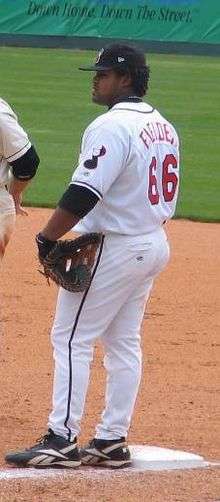
The Sounds changed affiliates in 2005, welcoming the Milwaukee Brewers as their new major league parent club. Coincidentally, the major/minor league sports connection between Nashville and Milwaukee was duplicated from 2005 to 2014, but with reverse roles, in ice hockey, as the Milwaukee Admirals were the top-level minor league affiliate of the National Hockey League's Nashville Predators.[121] The Sounds also debuted a new oval-shaped logo with a baseball player silhouetted against a yellow background hitting a ball toward the Nashville skyline with the city's name written above within a red border and the team name written in red and black script below.[24] The new Brewers affiliate was managed by Frank Kremblas and featured top prospects such as Rickie Weeks, Prince Fielder, Nelson Cruz, and Corey Hart. The affiliation started well as the club won the American Conference Northern Division title on the second-to-last day of the season with a 75–69 record.[122] The Sounds went on to win the American Conference championship against the Oklahoma RedHawks, three games to two, before sweeping the Tacoma Rainiers in three straight games in the finals to win the 2005 Pacific Coast League championship.[119] Outfielder Nelson Cruz clinched the title with a three-run home run with two outs in the 13th inning.[123] This was Nashville's first title since their previous league crown in 1982 and their first championship as a Triple-A team.[41]
On July 15, 2006, Nashville pitchers Carlos Villanueva, Mike Meyers, and Alec Zumwalt combined to pitch the fifth no-hitter in team history, a 2–0 win over the Memphis Redbirds.[124] On May 5–6, the Sounds participated in a 24-inning game against the New Orleans Zephyrs. The contest, played over the course of two days, lasted a total of eight hours and seven minutes. The game matched the longest game, in terms of innings played, in PCL history.[125] Additionally, several team and league records were broken by both clubs. The record was originally set on June 8, 1909, in a game between the San Francisco Seals and Oakland Oaks. A few years later, on September 10, 1911, the record was tied by a contest between the Sacramento Solons and Portland Beavers.[125] The Sounds finished the season with a 76–68 record under Kremblas, tied with the Iowa Cubs for first place in the division.[126] Nashville won the division title and advanced to the postseason by means of a tiebreaker (winning the regular season series versus Iowa, nine games to seven).[127][128] In the conference championship series, Nashville lost to the Round Rock Express, three games to two.[119]
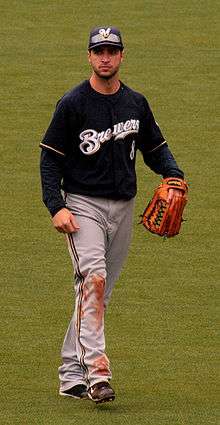
The 2007 Sounds included top Brewers prospects Ryan Braun and Yovani Gallardo. Braun, who made his major league debut on May 25, was named National League Rookie of the Year following the season, making him the third former Sounds player to win this award.[68] On June 25, Manny Parra pitched the club's second perfect game, only the third nine-inning perfect game in PCL history, against the Round Rock Express.[129] The team, led by PCL Manager of the Year Frank Kremblas,[130] captured the American Conference Northern Division title for the third straight year and finished the season with a league-best 89–55 record.[131] They were defeated by the New Orleans Zephyrs, three games to one, in the conference series.[132] Nashville-native knuckleball pitcher and 13-game winner R.A. Dickey won the PCL Pitcher of the Year Award.[130][133]
Massive flooding in the Midwest resulted in the Sounds and the Iowa Cubs playing a game with an official attendance of zero on June 14, 2008.[134] Though downtown Des Moines was under a mandatory evacuation, team officials received permission from the city to play the game as long as no fans were allowed into Principal Park. To keep fans away, the lights and scoreboard were not turned on, the game was not broadcast in the local market, and a message on the team's website announced that the game was postponed. PCL Commissioner Branch Rickey III believed that this was the first time such actions were taken out of necessity.[134] Kremblas' Sounds finished with a 59–81 record, the second-lowest in the team's history.[135]
The Sounds had planned to leave Greer Stadium in the mid-2000s for a new ballpark to be called First Tennessee Field,[136] but the project was abandoned after the city, developers, and team could not come to terms on a plan to finance its construction.[137][138] On October 30, 2008, following this failure to secure a new ballpark, Amerisports Companies LLC agreed to sell the Sounds to MFP Baseball, a New York-based group of investors consisting of Masahiro Honzawa, Steve Posner, and Frank Ward. Keeping the team in Nashville was one of the PCL's top criteria for approval of the sale. The transaction received final approval from Major League Baseball and the PCL on February 26, 2009.[139] MFP made significant renovations to Greer while it continued to explore options for building a new downtown ballpark.[140]
Rebounding from their 2008 campaign, the 2009 Sounds achieved a 75–69 record under new manager Don Money.[141] Despite a winning record and spending the majority of the season in first place, the Sounds finished the season two games behind their cross-state rivals, and eventual league champions, the Memphis Redbirds. The 2010 season proved to be reminiscent of the previous campaign. Though Nashville finished the year with a winning 77–67 record under Money, it was only good enough to place fourth (last) in the division.[142]
Caleb Gindl became the third player in team history to hit for the cycle when he accomplished the feat on July 10, 2011.[143] Center fielder Logan Schafer garnered national media attention when he initiated a triple play on August 20, 2011, against the Omaha Storm Chasers.[144][145] What made the rare occurrence even more unusual is that the ball first bounced off Schafer's glove and head before landing in his glove for the first out. He then returned the ball to the infield where second baseman Eric Farris and first baseman Mat Gamel completed the triple play by stepping on their respective bases.[146] With Money at the helm, Nashville ended the year with a 71–73 record, placing third in their division.[147]
Managed by Mike Guerrero, the 2012 Sounds finished the season in second place with a losing 67–77 record, sixteen games behind first-place Omaha.[148] Nashville had a franchise-worst win–loss record in 2013 with a 57–87 season that eclipsed the previous worst record from 2008.[149] Despite the team's performance, pitcher Johnny Hellweg won the PCL Pitcher of the Year Award,[150] and Guerrero was selected for the Mike Coolbaugh Award in recognition for his contributions to the game of baseball.[151] Tim Dillard, who pitched for the Sounds from 2007 to 2014, set three career franchise records during his Sounds career: wins (39), innings pitched (556⅔), and runs allowed (302).[53]
Prior to the 2014 season, the Sounds, Metro Nashville, and the State of Tennessee finalized a plan to build a new ballpark to replace Greer Stadium at the beginning of the 2015 season.[152][153] On August 27, 2014, the Sounds hosted the final game at Greer Stadium, an 8–5 loss to the Sacramento River Cats. In his only plate appearance, Nashville catcher Lucas May struck out swinging with a full count and the bases loaded to end the game.[154] The announced attendance was a standing-room-only crowd of 11,067, the first sellout since 2010, and the largest crowd since 2007.[155] The team, led by veteran minor league manager Rick Sweet, finished the season with a 76–67 record, in second place, two-and-a-half games behind Memphis.[156] Jimmy Nelson, the Brewers' top prospect at the start of the season, was elected PCL Pitcher of the Year; he received all but one of the votes.[157] The Sounds severed ties with the Brewers, with whom they had had the longest affiliation in franchise history, after the 2014 season citing poor on-field performance from recent Brewers Triple-A teams.[158] Overall, the Sounds had a 723–713 record over ten years as a Brewers affiliate.[41]
Oakland Athletics (2015–2018)
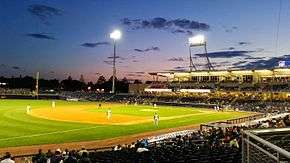
Having parted with Milwaukee, Nashville entered into a four-year player development contract with the Oakland Athletics that began in 2015.[159] The Sounds also adopted a new color scheme, set of logos, and uniforms before the season.[160] The team hired sports design firm Brandiose to create their new visual identity. At one point, the firm was asked to explore new team nicknames which included "Platinums", "Hits", "FireFlies", "Picks", "DrumSticks", and "Roosters".[161][162][163] Nashville chose to stick with the Sounds moniker, but initially elected to embrace a new color scheme that included Broadway Burnt Orange, Sunburst Tan, Neon Orange, and Cash Black.[160] However, the team returned to the previous red and black color scheme, with the addition of platinum silver as an accent color, before the start of the season after receiving mixed feedback from team fans.[164] The new logos incorporated elements that reflect Nashville's "Music City" nickname, such as guitars, guitar picks, and a guitar's sound hole, as well as neon signs such as those in the city's Broadway entertainment district.[24][164]
The start of the 2015 season marked the first time that the Sounds played at the new downtown First Tennessee Park, which is located at the site of the historic Sulphur Dell ballpark.[165] The Sounds defeated the Colorado Springs Sky Sox, 3–2 in 10 innings, in the inaugural home opener in front of an announced paid attendance of 10,459.[166] Max Muncy secured the win with a walk-off RBI double, scoring Billy Burns from first base, before being mobbed by his Sounds teammates on the field.[166] Under manager Steve Scarsone, Nashville finished their first season as an A's affiliate in third place with a 66–78 record.[167] Barry Zito, who won the American League Cy Young Award in 2002, made his return to professional baseball with the Sounds in 2015 after sitting out the 2014 season. Zito was lauded by his Nashville teammates for embracing the Triple-A lifestyle and for his commitment to the team: charting pitches between starts, coaching first base, and even buying dinner for the team on his birthday.[168]
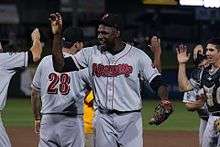
In 2016, PCL Manager of the Year Scarsone led the Sounds to a league-best 83–59 record and the American Conference Southern Division title, sending the team to the postseason for the first time since 2007.[130][169] The Sounds lost the American Conference series versus the Oklahoma City Dodgers, three games to two, including a dramatic back-and-forth game seven in Nashville.[170]
Ryan Christenson managed the club in 2017. Sounds pitchers Chris Smith, Sean Doolittle, Tucker Healy, and Simón Castro combined to pitch the franchise's seventh no-hitter on June 7, against the Omaha Storm Chasers, a 4–0 Nashville win.[171] All-Star Renato Núñez, whose three-run home run propelled the PCL past the International League to win the 2017 Triple-A All-Star Game, was selected as the game's MVP.[94] Joey Wendle set the career franchise record for doubles (102) during his 2015 to 2017 team career.[53] The Sounds finished their 40th anniversary season in second place with a 68–71 record.[172]
From July 29 to August 14, 2018, Nashville matched a franchise-record 15-game winning streak during which they outscored opponents, 89–48.[173] First baseman Nick Martini reached base safely in 66 consecutive games to set a new team record.[173] The team went on to finish the season in second place with a 72–68 record under manager Fran Riordan.[174] The Sounds declined to renew their contract with the Athletics, which was due to expire at the end of the season, choosing instead to seek a new major league affiliate.[175] Through four seasons of competition as the top farm club of the A's, the Sounds had a 289–276 record, their best record among all affiliations.[41]
Texas Rangers (from 2019)
Nashville entered into a four-year player development contract with the Texas Rangers that runs from 2019 to 2022.[176] The Rangers plan to visit First Tennessee Park for an exhibition game against the Sounds in either the 2019 or 2020 season.[177] The Sounds will participate in Copa de la Diversión ("Fun Cup"), an initiative by Minor League Baseball to connect teams with their local Hispanic communities, in which they will adopt a culturally-relevant on-field persona for certain games during the season. Their promotional moniker will be revealed in March 2019.[178]
References
Specific
- ↑ "Base-Ball To-Day at the Fair Grounds!". The Daily American. Nashville. October 10, 1884. p. 4. Retrieved June 15, 2018.
- ↑ Traughber, Bill (April 25, 2011). "Looking Back: The 1885 Nashville Americans". Nashville Sounds. Minor League Baseball. Retrieved May 15, 2018.
- 1 2 3 Traughber, Bill (April 26, 2010). "Looking Back: The 1887 Nashville Blues". Nashville Sounds. Minor League Baseball. Retrieved May 15, 2018.
- ↑ Traughber 2017, p. 31–34.
- ↑ Traughber, Bill (May 23, 2011). "Looking Back: The 1901 Nashville Vols". Minor League Baseball. Retrieved May 15, 2018.
- ↑ O'Neal 1994, p. 306–308.
- ↑ Nipper 2007, p. 117–120.
- 1 2 Traughber 2017, p. 125.
- ↑ Traughber, Bill (August 26, 2013). "Looking Back: Sulphur Dell Demolished in 1969". Minor League Baseball. Archived from the original on March 4, 2016. Retrieved February 6, 2015.
- ↑ "2009 Vanderbilt Commodores Media Guide" (PDF). Vanderbilt University. 2009. p. 72. Retrieved May 14, 2018.
- 1 2 3 Woody 1996, p. 60–63.
- ↑ O'Neal 1994, p. 157.
- ↑ Woody 1996, p. 64–65.
- 1 2 3 Nipper 2007, p. 101.
- ↑ Woody 1996, p. 190.
- 1 2 3 Chick, Bob (June 17, 1980). Top of the Chart. The Evening Independent. p. 2–C. Retrieved April 15, 2016.
- 1 2 3 4 Woody 1996, p. 66.
- 1 2 3 4 5 6 7 8 9 Traughber, Bill (April 8, 2008). "Commodore History Corner: Q&A with Larry Schmittou". College Sports Television. Retrieved March 25, 2009.
- ↑ Nipper 2007, p. 103.
- ↑ Woody 1996, p. 71–72.
- ↑ Woody 1996, p. 195.
- 1 2 Traughber 2017, p. xv.
- 1 2 Woody 1996, p. 90.
- 1 2 3 4 5 Caputo, Paul (June 20, 2015). "That Nashville Sound: The Story Behind the Nickname". SportsLogos.net. Retrieved March 21, 2016.
- ↑ Ruble, Drew (July 2006). "Vestige of Empire". Nashville Post. Archived from the original on February 4, 2012. Retrieved August 1, 2008.
- 1 2 3 4 5 6 Weiss, Bill; Wright, Marshall (2001). "69. 1980 Nashville Sounds". Minor League Baseball. Retrieved May 9, 2017.
- ↑ "Opening Day Lineups" (PDF). 2015 Nashville Sounds Media Guide. Minor League Baseball. 2015. p. 165. Archived from the original (PDF) on April 7, 2015. Retrieved April 9, 2015.
- ↑ Traughber 2017, p. 127.
- ↑ Traughber, Bill (August 7, 2006). "Looking Back: Sounds' First Game". Minor League Baseball. Archived from the original on October 21, 2008. Retrieved March 8, 2008.
- ↑ Woody 1996, p. 87.
- ↑ "1978 Southern League". Baseball-Reference.com. Sports Reference LLC. Retrieved May 24, 2017.
- 1 2 3 4 5 "Most Outstanding Pitchers". Southern League. Minor League Baseball. Retrieved March 17, 2016.
- ↑ Pratt, Kristin (July 20, 2006). "25 for 25: Stars in the Baseball America Universe". Baseball America. Archived from the original on April 15, 2016. Retrieved May 24, 2017.
- ↑ "Major Award Winners: Larry MacPhail Award". Minor League Baseball. Retrieved August 22, 2014.
- ↑ "Larry Schmittou". Tennessee Sports Hall of Fame. Retrieved May 30, 2017.
- ↑ The Nashville Sounds. The Nashville Sounds 1980 Official Souvenir Program. Nashville Sounds. 1980. p. 15.
- 1 2 "Southern League Past Champions". Southern League. Minor League Baseball. Retrieved March 1, 2015.
- ↑ "1979 Southern League Pitching Leaders". Baseball-Reference.com. Retrieved July 4, 2017.
- ↑ "1979 Southern League". Baseball-Reference.com. Sports Reference LLC. Retrieved May 24, 2017.
- 1 2 3 "All-Star game survives years of dormancy, format changes". The Florida Times-Union. July 5, 2003. Archived from the original on October 22, 2008. Retrieved March 7, 2008.
- 1 2 3 4 5 6 7 8 9 "Year By Year Results". Nashville Sounds. Minor League Baseball. Retrieved May 14, 2018.
- 1 2 3 4 O'Neal 1994, p. 332.
- 1 2 "Most Valuable Players". Southern League. Minor League Baseball. Retrieved March 17, 2016.
- ↑ "1980 Southern League Batting Leaders". Baseball-Reference.com. Sports Reference LLC. Retrieved May 24, 2017.
- ↑ "1980 Southern League". Baseball-Reference.com. Sports Reference LLC. Retrieved May 24, 2017.
- ↑ "Retired Numbers". Nashville Sounds. Minor League Baseball. Retrieved May 16, 2018.
- 1 2 Traughber, Bill (August 7, 2006). "Looking Back: 1981 New York Yankees Visit Greer Stadium". Minor League Baseball. Archived from the original on October 21, 2008. Retrieved March 8, 2008.
- ↑ "1981 Southern League". Baseball-Reference.com. Sports Reference LLC. Retrieved May 24, 2017.
- ↑ "1981 Southern League Pitching Leaders". Baseball-Reference.com. Sports Reference LLC. Retrieved May 24, 2017.
- ↑ "Most Valuable Player winners". Major League Baseball. Retrieved May 25, 2017.
- ↑ "1982 Nashville Sounds Statistics". Baseball-Reference.com. Sports Reference LLC. Retrieved May 24, 2017.
- ↑ "1982 Southern League". Baseball-Reference.com. Sports Reference LLC. Retrieved May 24, 2017.
- 1 2 3 4 5 6 7 8 9 10 "Top Ten Career Leaders". Nashville Sounds. Minor League Baseball. Retrieved July 9, 2017.
- 1 2 Rogers, Ricky (April 28, 1983). "Nashville Sounds in 1983". The Tennessean. Archived from the original on January 4, 2013. Retrieved April 11, 2008.
- 1 2 1983 Review. The Nashville Sounds 1984 Official Souvenir Program. Nashville Sounds. 1984. pp. 10–11.
- ↑ "1983 Southern League". Baseball-Reference.com. Sports Reference LLC. Retrieved May 24, 2017.
- 1 2 Squires, Tom (1985). 1984 Review. The Nashville Sounds 1985 Official Souvenir Program. Nashville Sounds. pp. 10–11.
- 1 2 "Eleven No-Hitters Thrown in Sounds History" (PDF). 2015 Nashville Sounds Media Guide. Minor League Baseball. 2015. p. 67. Archived from the original (PDF) on April 7, 2015. Retrieved April 7, 2015.
- ↑ "1984 Southern League". Baseball-Reference.com. Sports Reference LLC. Retrieved May 24, 2017.
- 1 2 3 Schmittou, Larry (1985). Message from the President. The Nashville Sounds 1985 Official Souvenir Program. Nashville Sounds. p. 8.
- 1 2 Woody 1996, p. 119.
- 1 2 3 Woody 1996, p. 101–102.
- 1 2 "Nashville Then: Nashville Sounds 1985 Season". The Tennessean. October 10, 2015. Retrieved October 26, 2015.
- ↑ The Nashville Sounds 1986 Official Souvenir Program. Nashville Sounds. 1986. p. 13.
- ↑ "1985 American Association". Baseball-Reference.com. Sports Reference LLC. Retrieved May 24, 2017.
- ↑ "1986 American Association". Baseball-Reference.com. Sports Reference LLC. Retrieved May 24, 2017.
- ↑ "1987 American Association". Baseball-Reference.com. Sports Reference LLC. Retrieved May 24, 2017.
- 1 2 3 "Rookie of the Year winners". Major League Baseball. Retrieved May 25, 2017.
- 1 2 3 "Managerial Merry-Go-Round" (PDF). 2015 Nashville Sounds Media Guide. Minor League Baseball. 2015. p. 45. Archived from the original (PDF) on April 7, 2015. Retrieved April 7, 2015.
- 1 2 "1988 American Association". Baseball-Reference.com. Sports Reference LLC. Retrieved May 24, 2017.
- 1 2 3 "Back-to-Back No-Hitters at Greer Stadium" (PDF). 2015 Nashville Sounds Media Guide. Minor League Baseball. 2015. p. 18. Archived from the original (PDF) on April 7, 2015. Retrieved April 7, 2015.
- ↑ "1989 American Association". Baseball-Reference.com. Sports Reference LLC. Retrieved May 24, 2017.
- ↑ Traughber, Bill (April 28, 2014). "Looking Back: Greer Hosts MLB Exhibition Games". Nashville Sounds. Minor League Baseball. Retrieved September 21, 2018.
- ↑ "1990 American Association". Baseball-Reference.com. Sports Reference LLC. Retrieved May 24, 2017.
- ↑ "Team History". Nashville Sounds. Minor League Baseball. Retrieved May 14, 2018.
- 1 2 3 4 "American Association Playoff Results". Triple-A Baseball. Retrieved May 25, 2017.
- ↑ "1990 American Association Pitching Leaders". Baseball-Reference.com. Retrieved July 4, 2017.
- 1 2 3 4 5 "American Association Special Award Winners". Triple-A Baseball. Retrieved August 22, 2014.
- ↑ "Yearly Attendance Totals" (PDF). 2015 Nashville Sounds Media Guide. Minor League Baseball. 2015. p. 149. Archived from the original (PDF) on April 7, 2015. Retrieved April 7, 2015.
- ↑ "1991 American Association". Baseball-Reference.com. Sports Reference LLC. Retrieved May 24, 2017.
- ↑ Triple-A Alliance. The Nashville Sounds 1992 Official Souvenir Program. Nashville Sounds. 1992. p. 38.
- ↑ "Former Expos Boss Might Go to Rockies". Daily News. July 16, 1992. Retrieved August 27, 2015.
- ↑ "Transactions". The Victoria Advocate. June 29, 1992. Retrieved August 27, 2015.
- ↑ "1992 American Association". Baseball-Reference.com. Sports Reference LLC. Retrieved May 24, 2017.
- ↑ Woody 1996, p. 127.
- 1 2 3 Woody 1996, p. 131.
- 1 2 Woody 1996, p. 132–34.
- ↑ Woody 1996, p. 132–33.
- ↑ Straughn, Katie (June 20, 2014). "7 Facts About Greer Stadium's Original Guitar Scoreboard". The Tennessean. Nashville. Retrieved May 16, 2018.
- ↑ "1993 American Association". Baseball-Reference.com. Sports Reference LLC. Retrieved May 24, 2017.
- ↑ O'Neal 1994, p. 287.
- ↑ Woody 1996, p. 105.
- ↑ "1994 American Association". Baseball-Reference.com. Sports Reference LLC. Retrieved May 24, 2017.
- 1 2 "Triple-A All-Star Game Records" (PDF). Triple-A Baseball. p. 5. Retrieved July 14, 2017.
- ↑ "1994 American Association Pitching Leaders". Baseball-Reference.com. Retrieved July 4, 2017.
- ↑ "1995 American Association". Baseball-Reference.com. Sports Reference LLC. Retrieved May 24, 2017.
- ↑ "Timeline: MJ through the years". The Sporting News. June 11, 1998. Archived from the original on August 8, 2002. Retrieved April 9, 2008.
- ↑ "1996 American Association". Baseball-Reference.com. Sports Reference LLC. Retrieved May 24, 2017.
- ↑ "1997 American Association". Baseball-Reference.com. Sports Reference LLC. Retrieved May 24, 2017.
- ↑ "1997 American Association Batting Leaders". Baseball-Reference.com. Retrieved July 4, 2017.
- ↑ "Notable Events in American Association History". Triple-A Baseball. Retrieved May 26, 2017.
- ↑ Russell, Keith (January 22, 1999). "Uniforms, GM part of Sounds' new look". Nashville Business Journal. Retrieved May 25, 2017.
- ↑ Team History. 2002 Nashville Sounds Yearbook. Nashville Sounds. 2002. pp. 22–23.
- ↑ "1998 Pacific Coast League". Baseball-Reference.com. Sports Reference LLC. Retrieved May 24, 2017.
- ↑ "All-Time Sounds Managers" (PDF). 2015 Nashville Sounds Media Guide. Minor League Baseball. 2015. p. 9. Archived from the original (PDF) on April 7, 2015. Retrieved April 7, 2015.
- ↑ Ammenheuser, David (September 19, 2018). "Nashville Sounds affiliate: A's to Rangers, what you should know". The Tennessean. Retrieved September 21, 2018.
- ↑ Traughber 2017, p. 186.
- ↑ "1999 Pacific Coast League". Baseball-Reference.com. Sports Reference LLC. Retrieved May 24, 2017.
- ↑ "Playoff Procedures". Pacific Coast League. Minor League Baseball. Retrieved May 25, 2017.
- ↑ "2000 Pacific Coast League". Baseball-Reference.com. Sports Reference LLC. Retrieved May 24, 2017.
- ↑ Cook, Ron (July 5, 2000). "Minor Inconvenience". Pittsburgh Post-Gazette. Retrieved August 24, 2015.
- ↑ "2001 Pacific Coast League". Baseball-Reference.com. Sports Reference LLC. Retrieved May 24, 2017.
- 1 2 "37 Years ... Three Sounds Hitting for the Cycle" (PDF). 2015 Nashville Sounds Media Guide. Minor League Baseball. 2015. p. 26. Archived from the original (PDF) on April 7, 2015. Retrieved April 7, 2015.
- ↑ "2002 Pacific Coast League". Baseball-Reference.com. Sports Reference LLC. Retrieved May 24, 2017.
- ↑ "Wasdin Tosses Perfect Game". Baseball America. April 7, 2003. Archived from the original on April 9, 2015. Retrieved April 9, 2015.
- ↑ "Pacific Coast League No-hit Games". Pacific Coast League. Minor League Baseball. Retrieved August 12, 2015.
- ↑ "2003 Pacific Coast League". Baseball-Reference.com. Sports Reference LLC. Retrieved May 24, 2017.
- ↑ "Postseason History" (PDF). 2015 Nashville Sounds Media Guide. Minor League Baseball. 2015. pp. 167–168. Archived from the original (PDF) on April 7, 2015. Retrieved April 7, 2015.
- 1 2 3 "Past Champions". Pacific Coast League. Minor League Baseball. Retrieved May 25, 2017.
- ↑ "2004 Pacific Coast League". Baseball-Reference.com. Sports Reference LLC. Retrieved May 24, 2017.
- ↑ "Predators Extend Affiliation with Milwaukee Admirals". Nashville Predators. National Hockey League. April 14, 2017. Retrieved May 25, 2017.
- ↑ "2005 Pacific Coast League". Baseball-Reference.com. Sports Reference LLC. Retrieved May 24, 2017.
- ↑ Leonard, Tim (September 17, 2005). "Sounds Capture PCL Championship". Minor League Baseball. Retrieved May 25, 2017.
- ↑ Rega, Marissa (July 15, 2006). "Nashville Trio Combines on No-hitter". Minor League Baseball. Retrieved May 25, 2017.
- 1 2 "Sounds, Zephyrs tie PCL record for longest game". ESPN. May 6, 2008. Archived from the original on June 14, 2006. Retrieved July 31, 2008.
- ↑ "2006 Pacific Coast League". Baseball-Reference.com. Sports Reference LLC. Retrieved May 24, 2017.
- ↑ "Pacific Coast League Playoff Procedures". Pacific Coast League. Retrieved September 1, 2014.
- ↑ "2006 Schedule and Results". Nashville Sounds. Minor League Baseball. Retrieved May 15, 2018.
- ↑ McConnell, Ryan (June 25, 2007). "Sounds' Parra Perfect in His Second PCL Start". Minor League Baseball. Retrieved May 15, 2018.
- 1 2 3 "Pacific Coast League Special Award Winners". Triple-A Baseball. Retrieved August 22, 2014.
- ↑ "2007 Pacific Coast League". Baseball-Reference.com. Sports Reference LLC. Retrieved May 24, 2017.
- ↑ Blinn, Michael (September 9, 2007). "Mulvey pitches Zephyrs into Finals". Minor League Baseball. Retrieved May 15, 2018.
- ↑ "2007 Pacific Coast League Pitching Leaders". Baseball-Reference.com. Retrieved July 4, 2017.
- 1 2 Peterson, Randy (June 15, 2008). "Only Sounds of silence play at empty park". The Tennessean. p. 1C.
- ↑ "2008 Pacific Coast League". Baseball-Reference.com. Sports Reference LLC. Retrieved May 24, 2017.
- ↑ "First Tennessee to Put Name on Proposed Sounds Stadium". Nashville Business Journal. November 21, 2003. Archived from the original on April 21, 2015.
- ↑ "Purcell Firm on City, Sounds Stadium Agreement". WSMV. Nashville. September 11, 2006. Archived from the original on October 21, 2008.
- ↑ "Deadline For Sounds Stadium Proposal Passes". WSMV. Nashville. April 16, 2007. Archived from the original on May 24, 2011.
- ↑ Wild, Danny (February 26, 2009). "Sounds makeover begins with new owners, GM". Minor League Baseball. Retrieved May 15, 2018.
- ↑ Rau, Nate (August 29, 2010). "Nashville Sounds search for a new home". The Tennessean. Nashville. Retrieved August 30, 2010.
- ↑ "2009 Pacific Coast League". Baseball-Reference.com. Sports Reference LLC. Retrieved May 24, 2017.
- ↑ "2010 Pacific Coast League". Baseball-Reference.com. Sports Reference LLC. Retrieved May 24, 2017.
- ↑ Pentis, Andrew (July 11, 2011). "Sounds' Gindl hits for the cycle". Minor League Baseball. Retrieved May 15, 2018.
- ↑ Smith, Stephen (August 22, 2011). "Player catches ball off head, turns triple play". CBS News. Retrieved May 25, 2017.
- ↑ Smith, Stephen (August 21, 2011). "Logan Schafer Starts Triple Play After Ball Bounces Off Head in Minor League Game". The Huffington Post. Retrieved May 25, 2017.
- ↑ Emrich, Robert (August 21, 2011). "Schafer, Sounds turn 'crazy' triple play". Minor League Baseball. Retrieved May 25, 2017.
- ↑ "2011 Pacific Coast League". Baseball-Reference.com. Sports Reference LLC. Retrieved May 24, 2017.
- ↑ "2012 Pacific Coast League". Baseball-Reference.com. Sports Reference LLC. Retrieved May 24, 2017.
- ↑ "2013 Pacific Coast League". Baseball-Reference.com. Sports Reference LLC. Retrieved May 24, 2017.
- ↑ Emrich, Robert (August 28, 2013). "Johnny Hellweg Named PCL Pitcher of the Year". Minor League Baseball. Retrieved May 25, 2017.
- ↑ "Major Award Winners: Mike Coolbaugh Award". Minor League Baseball. Retrieved May 25, 2017.
- ↑ Hale, Steven (December 4, 2013). "Sounds Ballpark Deal Rounds Second, Headed for Final Vote Next Week". Nashville Scene. Retrieved December 8, 2013.
- ↑ "Baseball Has Come Home". Inside Pitch. 4 (1). Nashville. April 17, 2015. pp. 8–19.
- ↑ "Scoreboard: Sacramento at Nashville; August 27, 2014". Nashville Sounds. Minor League Baseball. August 27, 2014. Retrieved May 25, 2017.
- ↑ Organ, Mike (August 28, 2014). "Greer goodbye gets emotional". The Tennessean. Retrieved August 28, 2014.
- ↑ "2014 Pacific Coast League". Baseball-Reference.com. Sports Reference LLC. Retrieved May 24, 2017.
- ↑ "Nelson Elected PCL Pitcher of the Year". Minor League Baseball. August 27, 2014. Retrieved May 25, 2017.
- ↑ McCalvy, Adam (September 17, 2014). "Melvin irked over breakup with Triple-A affiliate". Major League Baseball. Archived from the original on August 13, 2017. Retrieved May 25, 2017.
- ↑ Mike, Organ (September 18, 2014). "Nashville Sounds to be Oakland A's affiliate". The Tennessean. Retrieved April 4, 2018.
- 1 2 "What The Sounds Are Really Telling Us With Their Re-Branding". Nashville Scene. October 9, 2014. Retrieved May 25, 2017.
- ↑ "Nashville B.T.S. – Pt.1". The Clink Room. Brandiose Studios, Inc. April 27, 2015. Retrieved May 25, 2017.
- ↑ "Nashville B.T.S. – Pt.2". The Clink Room. Brandiose Studios, Inc. April 28, 2015. Retrieved May 25, 2017.
- ↑ "Nashville B.T.S. – Pt.3". The Clink Room. Brandiose Studios, Inc. April 29, 2015. Retrieved May 25, 2017.
- 1 2 "Sounds Unveil New Logos, Uniforms". Minor League Baseball. January 21, 2015. Retrieved May 25, 2017.
- ↑ Arnold, Sky (April 17, 2015). "Nashville Sounds Opening Day at First Tennessee Park". WZTV. Nashville. Archived from the original on April 18, 2015. Retrieved April 18, 2015.
- 1 2 "Sounds Walk-Off in Home Opener". Minor League Baseball. April 18, 2015. Retrieved May 25, 2017.
- ↑ "2015 Pacific Coast League". Baseball-Reference.com. Sports Reference LLC. Retrieved May 24, 2017.
- ↑ Slusser, Susan (July 21, 2015). "Barry Zito Doing Well in Minors, but Would Love Major Upgrade". SFGate. Hearst Communications, Inc. Retrieved September 5, 2015.
- ↑ "2016 Pacific Coast League". Baseball-Reference.com. Sports Reference LLC. Retrieved May 24, 2017.
- ↑ "Sounds Drop Heart-Breaker to End Season". Minor League Baseball. September 11, 2016. Retrieved May 25, 2017.
- ↑ Heneghan, Kelsie (June 8, 2017). "Smith leads way for Sounds in no-hitter". Minor League Baseball. Retrieved October 10, 2018.
- ↑ "2017 Pacific Coast League". Baseball-Reference.com. Sports Reference LLC. Retrieved September 4, 2017.
- 1 2 "2018 Nashville Sounds Season in Review". Nashville Sounds. Minor League Baseball. September 21, 2018. Retrieved September 22, 2018.
- ↑ "2018 Pacific Coast League". Baseball-Reference.com. Sports Reference LLC. Retrieved September 3, 2018.
- ↑ Slusser, Susan (September 16, 2018). "Sources: A's told they won't be back at Triple-A Nashville". SFGate.com. Retrieved September 16, 2018.
- ↑ "Sounds, Rangers Announce Affiliation Through 2022". Ballpark Digest. September 20, 2018. Retrieved September 20, 2018.
- ↑ Organ, Mike (September 20, 2018). "Nashville Sounds and Texas Rangers will play exhibition game in 2019 or 2020". MSN. Retrieved September 21, 2018.
- ↑ "Minor League Baseball's 'Copa de la Diversión' Hispanic fan engagement initiative expands to 72 teams for 2019". Minor League Baseball. September 24, 2018. Retrieved September 24, 2018.
General
- Nipper, Skip (2007). Baseball in Nashville. Charleston, South Carolina: Arcadia Publishing. ISBN 978-0-7385-4391-8.
- O'Neal, Bill (1994). The Southern League: Baseball in Dixie, 1885–1994. Eakin Press. ISBN 0-89015-952-1.
- Traughber, Bill (2017). Nashville Baseball History: From Sulphur Dell to the Sounds. South Orange, New Jersey: Summer Games Books. ISBN 978-1-938545-83-2.
- Woody, Larry (1996). Schmittou: A Grand Slam in Baseball, Business, and Life. Nashville: Eggmann Publishing Company. ISBN 1-886371-33-4.